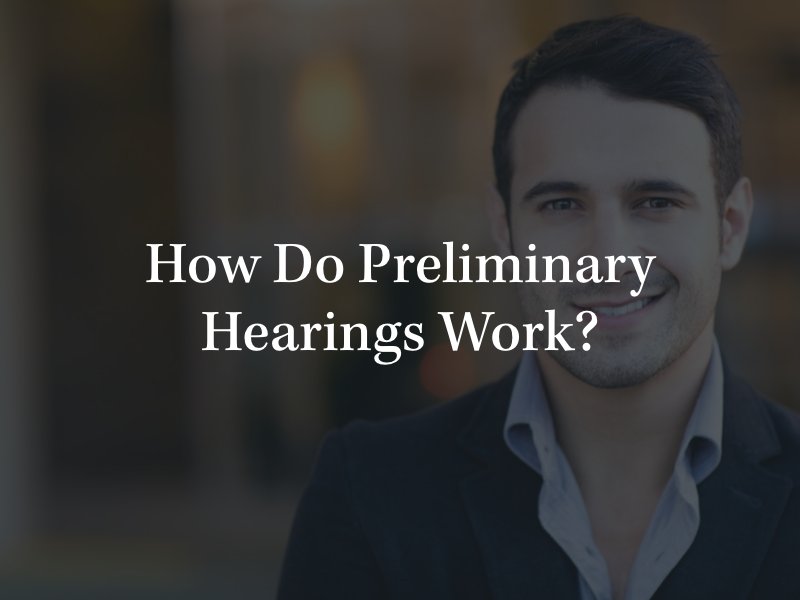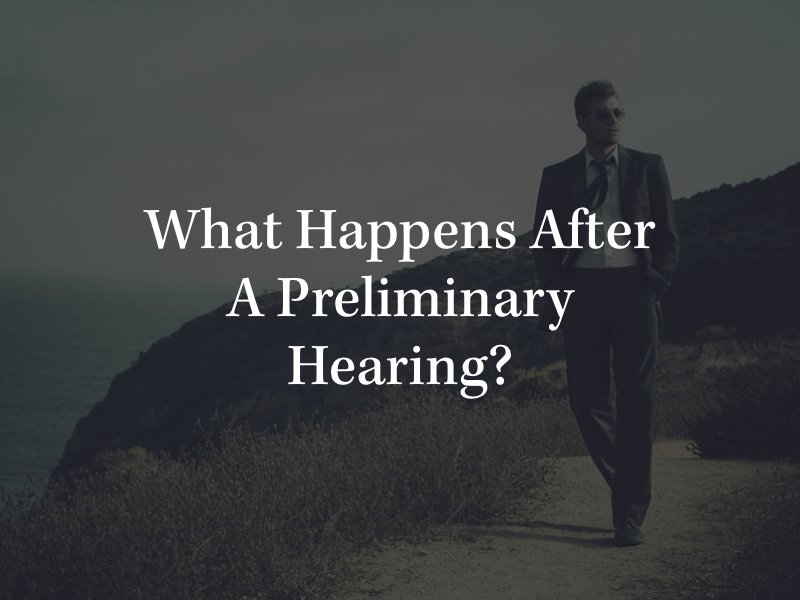Facing a preliminary hearing can feel overwhelming, especially for anyone unfamiliar with the legal process. This crucial stage determines whether your case will proceed to trial, making it vital to understand the procedures and your rights.
At Ciccarelli Law Offices, your Lancaster criminal defense attorney is dedicated to providing clear guidance and strong legal representation to help you get through your preliminary hearing with confidence. Here is more about how preliminary hearings work and what to expect in the aftermath of your preliminary hearing.

What Is a Preliminary Hearing?
A preliminary hearing is a critical step in Pennsylvania’s criminal justice process. They are designed to determine whether there is enough evidence to establish probable cause that a crime was committed and that the defendant is responsible. This hearing is not about determining guilt or innocence but rather ensuring that weak or unsupported cases do not move forward unnecessarily.
Preliminary hearings are part of the pre-trial process and are generally held in cases involving felony charges. For misdemeanor cases, this step may be bypassed in favor of a direct trial. The outcome of a preliminary hearing can significantly impact the direction of your case, making it essential to approach this stage with a well-prepared defense.
Who Attends a Preliminary Hearing?
Several key parties participate in a preliminary hearing. The judge oversees the proceeding, evaluates the evidence presented, and decides whether the case will move forward. The prosecutor presents evidence to establish probable cause, while your criminal defense attorney challenges the evidence and advocates for dismissal when appropriate. Witnesses may also be called to testify, although their appearances are often limited.
Defendants are required to attend their preliminary hearings. This provides an opportunity for you to observe the prosecution’s evidence and strategy while working closely with your criminal defender to identify weaknesses in the prosecutor’s case.
How Preliminary Hearings Are Different From a Trial
Preliminary hearings differ significantly from trials. Unlike a trial, where a jury determines guilt or innocence, preliminary hearings are decided solely by a judge. The rules of evidence are also more relaxed since the prosecution only needs to meet the standard of probable cause rather than proving guilt beyond a reasonable doubt according to the Bench Book for Pennsylvania Judges.
Additionally, the scope of evidence presented at a preliminary hearing is limited. The prosecution typically focuses on key elements of the alleged offense, while the defense may reserve its full arguments for later stages. Understanding these distinctions can help defendants manage expectations and prepare for their hearing.
Hearsay in Preliminary Hearing
Hearsay refers to an out-of-court statement presented in court. Generally, hearsay is inadmissible at trial because it prevents the defense from cross-examining the original speaker. However, the rules governing hearsay at preliminary hearings are more flexible.
Under 234 PA Code Rule 542(E), hearsay is admissible in preliminary hearings to establish elements of the offense in question. This allows prosecutors to meet their burden of proof without requiring every witness to testify in person. For instance, a police officer may testify about statements made by witnesses, even if those witnesses are not present in court.
This rule simplifies the process for prosecutors but can create challenges for defendants. Hearsay evidence may lack credibility, yet it can still be used to establish probable cause. Understanding how hearsay applies at this stage is essential for building a strong defense.
Implications for the Defense
The use of hearsay at preliminary hearings limits the defense’s ability to cross-examine witnesses and challenge the evidence directly. Despite this limitation, an experienced theft crime attorney can still identify weaknesses in the prosecution’s case and argue against the sufficiency of the evidence. Strategic preparation and thorough analysis are key to addressing this aspect of the hearing as effectively as possible.
Can a Case Be Dismissed at the Preliminary Hearing?
Dismissal at a preliminary hearing occurs when the judge determines that the prosecution has failed to establish probable cause. This means the evidence presented is insufficient to justify moving the case forward to trial. While dismissal does not prevent the prosecution from re-filing charges in some circumstances, it can provide an opportunity for the defense to resolve the matter favorably.
Common Reasons for Case Dismissal
Cases may be dismissed at the preliminary hearing for several reasons, including:
- Lack of probable cause – The prosecution fails to show sufficient evidence linking the defendant to the alleged crime.
- Unreliable evidence – Key evidence is deemed inadmissible or lacks credibility.
- Procedural errors – Mistakes by the prosecution, such as failing to meet filing deadlines, can result in dismissal.
Dismissal at this stage is often the result of meticulous preparation and a proactive defense strategy.

What Happens After a Preliminary Hearing?
If the judge finds probable cause, the case moves forward to the next phase, which typically involves arraignment or trial preparation. At this stage, the prosecution files formal charges, and the defense begins preparing its case for trial. The preliminary hearing sets the tone for what follows.
After the preliminary hearing, defendants may face various scenarios. These include negotiating plea agreements, filing pre-trial motions to exclude evidence, or participating in diversion programs for eligible offenses as outlined by the Philadelphia District Attorney’s Office. Each outcome depends on the specifics of the case and the strategies employed by the defense.
The work does not end with the preliminary hearing. A comprehensive legal strategy is essential to working through the subsequent phases of the case. A reputable drug crimes lawyer with Ciccarelli Law Offices can provide continuous support, help you make informed decisions, and pursue the best results possible based on the specific circumstances of your case.
Risks of Facing a Preliminary Hearing Alone
Preliminary hearings involve complex legal rules and procedures that can be difficult to navigate without professional guidance. From understanding evidentiary standards to identifying procedural errors, the stakes are high, and mistakes can have long-lasting consequences.
Failing to address weaknesses in the prosecution’s case or protect your rights during a preliminary hearing can strengthen the state’s position. This may lead to unnecessary charges, harsher penalties, or missed opportunities to challenge the evidence.
Turn to Ciccarelli Law Offices for Legal Support During Your Preliminary Hearing
Preliminary hearings are a critical stage in any criminal case, and having the right legal representation can make all the difference. Ciccarelli Law Offices has 30+ years of trial experience and is here to provide a compassionate and skilled defense tailored to your unique needs. Contact us today by phone or through our convenient contact form to learn how we can help you with your preliminary hearing and protect your future.
